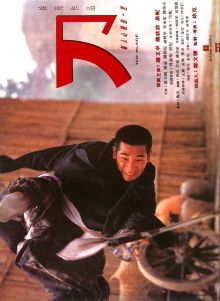Tsui Hark is of course a household name and this one was made smack in the middle of his heyday as a maker of Hong Kong kung fu films. Yet most people probably would not have watched this one as I think it was considered a failure at the time. Modern critics however have reevaluated it as with its brutal violence and cynical attitude to morality, it makes a bold statement that is markedly different from its peers. It remains poorly made in many ways and has many flaws, yet just by being so different it deserves our attention.
Ding-on and Iron Head are the two leading apprentices to a swordsmith whose daughter Ling is attracted to both of them and narrates the film. One day in town the two witness a monk fight off a gang of bandits. Though he beats them easily with his superior kung fu, they later ambush and kill him. Iron Head wants to fight the thugs but is restrained by Ding-on who reports the matter to their master. The rift between the two widens when the master chooses Ding-on to be his heir. Ding-on overhears his master speak about his father and how he died at the hands of a thug named Flying Dragon. He decides to leave to seek revenge, especially as he knows the other apprentices dislike him. Ling tries to pursue him but is caught by the same group of thugs who killed the monk. When Ding-on turns back to save her, he loses his right arm and tumbles off a cliff while Iron Head returns Ling to the foundry.
This is a pretty standard wuxia plot so no prizes for guessing that Ding-on survives the fall and eventually emerges stronger for it. The film is deliberately rough around the edges as well, pretty much all of the acting is subpar and to top it all off, the kung fu is ridiculous, consisting of almost entirely of wildly exaggerated spinning. Yet the film strikes a bold tone with this unique style and by having a righteous and powerful monk die early on by weaker enemies piling up on him and using dirty tricks shows us that this is a brutal and cynical world. There is seemingly no central authority at all so those who are strong and willing to resort to violence just seize what they want and kill who they want. A prostitute character best exemplifies this moral nihilism, teaching Ling that all men are the same and will force their will on women. Ling too tries to play Ding-on and Iron Head against each other but her girlish dreams of romance are turned to ashes. The film’s sheer crudeness, frenetic camera and wild colors perfectly complement this bleak view of a dystopian world that knows neither order nor peace.
Unfortunately it sometimes feels that this film is too quirky to be commercially successful but not quite good enough to be truly great. Vincent Zhao may be a skilled martial artist but he can’t emote anything as Ding-on. How he ends up getting saved and learning half of a martial art is so stereotypical it’s a good thing the film doesn’t elaborate on it. Then there is the dialogue which tries so hard to feel wuxia but really skirts the edge of being cringey. Similarly the fighting looks superficially impressive in the heat of the moment and it immediately strikes you how silly it looks once you stop to think about it. The sad thing is that you can tell Tsui Hark really tried but is just too inconsistent to pull it off. Some directors seem able to touch the sublime with almost effortless grace but this film stumbles and fudges around so much that it never gets there. This film is a mess in a kind of interesting way but it’s still a mess, not really a refined, purposeful work of art.
Tsui would go on to make many, many wuxia films with bigger budgets and much more polish. Yet this one still stands out for its for its cynicism and bleak world. Even the fact that it is told from the point of view of Ling who wants to believe in the romantic vision of a world with noble heroes and ideals make it unique. It’s not great and it feels like a product of its time but it’s still worth a look.

One thought on “The Blade (1995)”